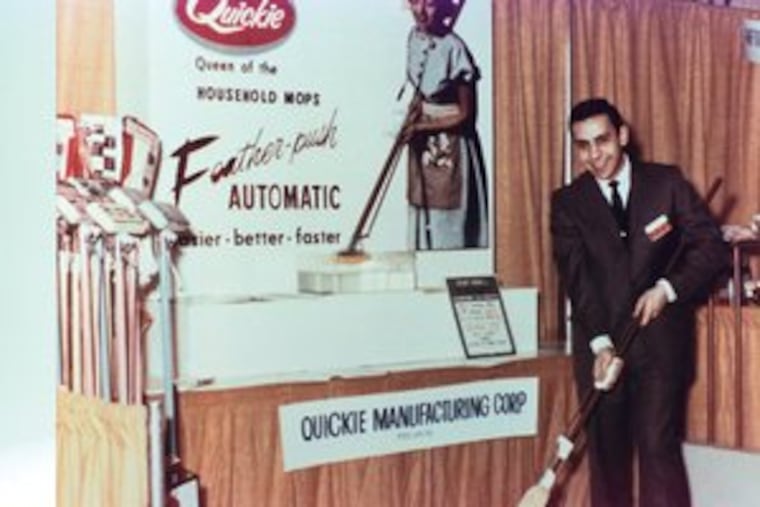A Phila. original cleans up
The Quickie Manufacturing Corp. is a leader in all manner of cleaning tools. It was founded by a mop inventor who wanted his dinner on time.

Bedros Vosbikian had ironclad rules in his Melrose Park home. Lo and behold, one evening in 1950, his wife, Vartanoush, failed to promptly serve dinner when he returned from his hardware factory.
Vartanoush!
The floors, Bedros, the floors, she pleaded as she scrubbed. I have to finish the floors.
A year later, Vosbikian introduced one of the unheralded inventions of the 20th century: the automatic sponge mop. He patented the self-wringing action and designed the mop with chrome-plated parts and stainless-steel springs for department stores.
Vosbikian passed Quickie Manufacturing Corp. to son Peter, who made the mop the core of a cleaning-tools company that in 2006 manufactured and sold 52 million mops, brooms, hand brushes, buckets, and other cleaning-tool products.
"It's the only one we carry," said Mitchell Cohen, owner of Cohen & Co. Hardware, 615 E. Passyunk Ave., who was restocking sponge mops on Wednesday. "Quickie's a decent mop. We don't get a lot of returns. They don't fall apart."
This Microsoft of Mops, so to speak, has its headquarters in a warehouse-looking building one mile off Route 130 in a commercial section of Cinnaminson, Burlington County. The company is privately held and does not disclose sales, but it says it controls about 25 percent of the U.S. cleaning-tools market, estimated at $1.2 billion at retail.
Home-center chains like the Home Depot Inc. and Lowe's Cos. Inc. have sections devoted to Quickie and its cleaning tools. Quickie's biggest revenue item is the 2-in-1 Bulldozer push broom, and its highest-volume product is a toilet brush with container cup.
The company has begun licensing deals to co-brand new products, and it has plans to expand into Europe. This month, Quickie launched a scented broom with the British company Reckitt Benckiser P.L.C., which owns Air Wick and Lysol.
The mop business, which generally flies under the radar of the financial press, is fragmented with new entrants - everyone seems to have an idea for a better one. Two of Quickie's biggest competitors are Freudenburg Household Products, which sells the O'Cedar and Vileda mop brands, and the Libman Co., of Arcola, Ill., marketer of the "Wonder Mop."
Brian Sowinski, director of marketing at Libman, said that the mop-and-broom business was competitive and that "it's sort of hard to reinvent the wheel at this point." The products fill "a pretty basic need," he said, noting that "people get attached to their mops."
Mop companies face imports and Procter & Gamble Co.'s Swiffer disposable wipes, a new category called quick-clean products, which has sponged up some of the traditional growth.
"This has always been a competitive business, even before China. Nothing has changed," said Peter Vosbikian, 66, who is still at the company and is Quickie's chairman. There is a 1963 publicity photo of Vosbikian dressed in a suit and skinny tie modeling the "Ring-A-Mop" in the company archives. "Years ago, people were making mops and brooms in their garages."
Like cheesesteaks and the Mummers, Bedros Vosbikian's automatic sponge mop is a Philadelphia original.
According to an old news clip, he developed a prototype with a broom handle, a breadboard, a rubber sponge, an aluminum cookie sheet, wing nuts and bolts. He manufactured the mop for years in a two-story factory in North Philadelphia near Broad and Lehigh Streets.
In the mid-1970s, the company relocated to Cinnaminson. Less than two years later, Quickie signed a contract to distribute through Kmart Corp. and expanded into a former macaroni plant in Delran.
At its peak in the Philadelphia area, the company had 300 employees in South Jersey. Quickie saw a need for more manufacturing capacity and opened a plant in North Carolina. It closed the South Jersey plants, but kept the headquarters, with about 70 employees, in Cinnaminson.
Michael Magerman waves a broom that scents the air in Quickie's conference room. "Smell that," he said, his nostrils flaring as he sucks in the air. "I love this product."
Magerman joined Quickie as chief executive officer in 2005 after Vosbikian sold a majority interest to the New York investment firm Centre Partners. Financial details were not disclosed.
Magerman was raised in Jenkintown, and his father ran a Philadelphia trousers-manufacturing plant that closed in the mid-1980s. Magerman headed to the West Coast as a young man and cofounded Odyssey Golf with his brother and others. Odyssey developed a new-technology putter that gained acceptance with pros on tour. Callaway Golf Co. bought Odyssey for $130 million in 1997. It was bittersweet for Magerman: Callaway fired him.
"The distinguishing factor is what you do with the end of the stick," Magerman, 45, quips about the difference between a $10 broom and a $100 putter.
Magerman talks about the "compelling value propositions" of Quickie brooms and mops. He signed the licensing agreement with Reckitt Benckiser that led to the scented broom, which will land in 14,000 U.S. stores.
He also signed a licensing agreement with Microban International Ltd. for antimicrobial materials for Quickie products, which the company hopes will ease concerns that dirty sponges and mops breed germs and diseases.
Peter Vosbikian was 9 years old when his father came home to a late dinner. The groundbreaking sponge mop that ensued "has stood the test of time," Peter Vosbikian said.
Bedros Vosbikian, though, is mostly forgotten. "God rest his soul. When my dad died, it was in his obituary," Peter Vosbikian said. "But that's about it."